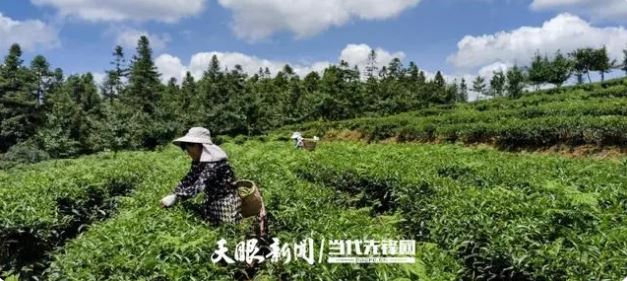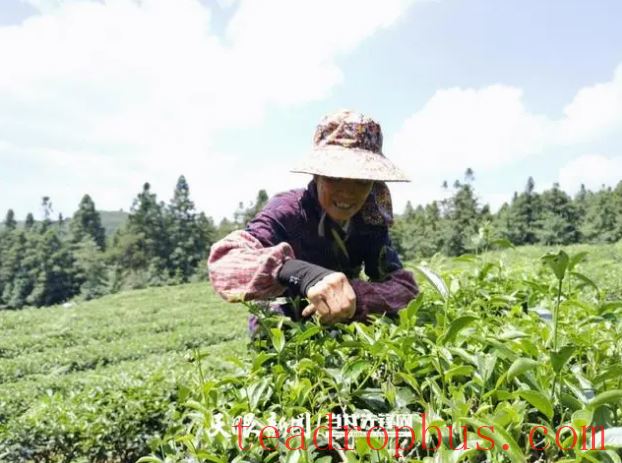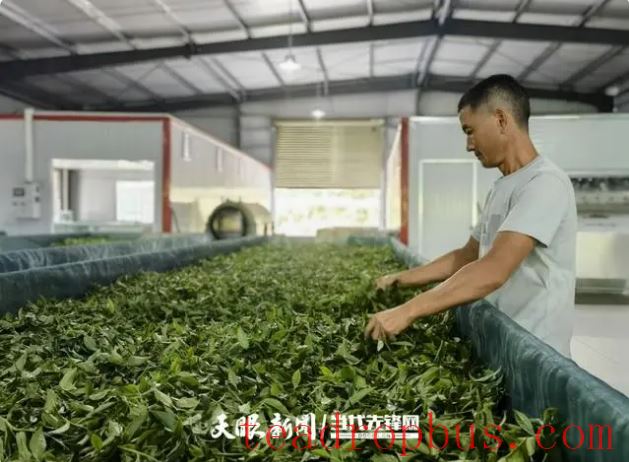In the height of summer, the Tian Gui Tea Garden Ecological Construction Demonstration Base in Wudang District is a verdant expanse with a fragrant aroma, where over 50 tea farmers are picking ecological teas such as Fuding Dabai, Mei Zhan, and Jin Guanyin.

Tian Gui Tea Garden Ecological Construction Demonstration Base, Wudang District
The Tian Gui Tea Garden, a significant part of Wudang District's tea industry, has a total planned area of 3,000 mu (approximately 200 hectares), including a core garden area of 1,000 mu (approximately 67 hectares). It operates under the “company + farmer” model, primarily cultivating varieties like Fuding Dabai, Jin Guanyin, Huang Guanyin, and Rui Xiang. The garden also features a processing plant covering 2,700 square meters equipped with over 60 pieces of tea-processing machinery, capable of producing 200,000 catties (approximately 100,000 kilograms) of dry tea annually. To further improve the local environment and enhance agricultural product competitiveness, Wudang District has implemented an ecological construction demonstration project at Tian Gui Tea, advancing initiatives to reduce fertilizer and pesticide usage while applying organic fertilizers and green pest control measures. These efforts aim to increase agricultural efficiency and farmer incomes, facilitating a transition towards sustainable green agriculture.
The Tian Gui Tea Garden Ecological Construction Demonstration Base covers 300 mu (approximately 20 hectares) and primarily grows varieties such as Qiantea No.1, Fuding Dabai, Mei Zhan, and Jin Guanyin, focusing on the application of Wudang District's ecological management technology for tea gardens. This technology system includes comprehensive reduction of chemical fertilizers and pesticides through optimized fertilizer management, scientific pruning techniques, and biological pesticide alternatives, achieving a 100% reduction in both chemical fertilizers and pesticides.

Tian Gui Tea Garden Ecological Construction Demonstration Base, Wudang District
“In constructing this base, we have applied biotechnology to implement measures such as fertilizer management, green pest control, and field management for tea gardens. Through optimizing soil ecology, ecological pest control, and environmental construction, we aim to gather supportive scientific data and establish practical standards and procedures for tea garden management. This will accelerate the improvement of tea garden management levels in the region and promote development towards low-carbon, ecological, and organic practices,” said Wang Jifa, head of the Science, Education, and Technology Department of the Wudang District Bureau of Agriculture and Rural Affairs.
The construction of the Tian Gui Tea Garden Ecological Construction Demonstration Base will help drive the district's tea industry towards greener and more organic practices. It is expected that fresh tea yields per mu will increase by over 50 kilograms, creating employment opportunities for local farmers. The project is anticipated to provide direct employment for 4,500 workers, with a total labor expenditure of 360,000 yuan. Additionally, the base's establishment will further advance the development of Wudang District's specialty agriculture and eco-tourism, contributing to comprehensive rural revitalization.

Tian Gui Tea Garden Ecological Construction Demonstration Base, Wudang District
It is understood that in 2024, the grassroots agricultural technology extension system reform and construction grant project in Wudang District will establish four agricultural science and technology experimental demonstration bases. These include one provincial-level demonstration base and three county-level demonstration bases. At these bases, various agricultural technologies and practices, including dominant grain varieties and promoted agricultural technologies, will be widely applied. New varieties, technologies, models, and machinery will be demonstrated, promoting the adoption of superior varieties and advanced applicable technologies. This will comprehensively increase the implementation rate of promoted agricultural technologies, providing strong technical support for accelerating agricultural and rural modernization and consolidating and expanding poverty alleviation achievements.